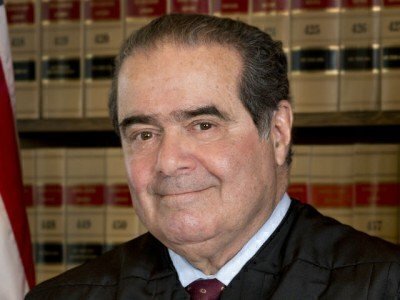The late Justice Antonin Scalia was larger than life. A passionate defender of his own constitutional vision of textualism and originalism, Scalia would surely relish a similarly passionate debate over the constitutional vision of his successor—with both Republicans and Democrats defending their respective views of how the Constitution should be interpreted and what role the Supreme Court should play in American democracy. Instead of triggering a constitutional debate, however, Scalia’s tragic death has led to a political standoff, with both Republican and Democratic activists vowing to make the Court a key voting issue in the 2016 election.
 Everyone agrees that this is the most significant Supreme Court vacancy in a generation. But what competing visions of the Constitution, precisely, are voters choosing between?
Everyone agrees that this is the most significant Supreme Court vacancy in a generation. But what competing visions of the Constitution, precisely, are voters choosing between?The constitutional stakes could hardly be higher. Scalia passed away not only in the middle of a heated election year, with the presidency and control of the Senate hanging in the balance, but during a particularly consequential term at the Supreme Court, with blockbuster cases on abortion, contraception, unions, immigration, and voting rights on the docket. And, of course, the future of the Supreme Court itself is now at stake. With the opportunity to replace Scalia, President Obama has a chance to shift the Court’s ideological balance and to create a vigorous liberal majority on the Court for the first time since the 1960s. If Scalia is replaced by Judge Merrick Garland, or by another liberal nominee, America may also face the possibility of a chief justice—John Roberts—who no longer can command reliable Supreme Court majorities in closely contested cases. (The chief justice decides who writes for the Court in cases when he is in the majority; even after the rate of dissenting opinions and the cases decided by a one vote margin began to rise in the 1940s, chief justices in the twentieth century continued to assign the majority of cases.) Furthermore, Justice Anthony Kennedy—the longtime swing vote—may no longer decide which side wins when the Court is closely divided. The constitutional landmarks that law students and citizens have taken for granted for decades could be dramatically transformed.
These prospective changes raise a number of provocative issues and critical constitutional questions. Will a new Court:
- Expand individual gun rights or cut back on them?
- Strike down state efforts to regulate abortions or uphold them?
- Defer to sweeping claims by the president to prosecute the war on terror or cut back on the president’s prerogative?
- Defend a color-blind vision of the Fourteenth Amendment or permit the use of race as a factor in college admissions?
- Strike down state efforts to require voter IDs at the polls or defer to state claims that these efforts are designed to combat voter fraud?
- Strike down the Obama administration’s ambitious efforts to address climate change and immigration or defer to the president’s actions in these areas?
- Overturn Citizens United v. FEC or continue to deregulate America’s campaign-finance system as a violation of the First Amendment?
- Uphold the death penalty as a legitimate use of state power or answer certain justices’ calls to declare the practice unconstitutional?
- Deal effectively with new looming constitutional issues, such as the balance between security and privacy raised by the Apple case and the balance between privacy and free-speech raised by the battle between Hulk Hogan and Gawker?
- Embrace new constitutional philosophies as an alternative to Scalia’s jurisprudence of original understanding?
- Be minimalists or democratic constitutionalists? Or, to use Cass Sunstein’s categories, will the new majority be Heroes, Soldiers, Burkeans, or Mutes?
These are all critical questions, with strong proponents on all sides. However, they risk being overshadowed by news coverage focused on the political jockeying around Garland’s nomination, instead of the substantive issues it raises.
In the coming months, the National Constitution Center and The Atlantic will work together to make sure that these important constitutional questions remain a central part of the public debate over the Supreme Court vacancy. Our series will explore the changing nature of the Court across a range of constitutional issues, including how a Garland Court would differ from a Scalia Court; how a Garland Court would differ from an Elizabeth Warren Court, to name just one possible nominee on the progressive wish list; and how the internal dynamics of the Court could change as a result of new voices. We will ask commentators from the right and the left to reflect on critical areas of constitutional law, on how adding a new member to the group of justices might change the Court’s internal dynamics, on how Roberts and Kennedy might adjust to the reality of a new progressive majority, and on historical precedents for this transition, and for the confirmation battle itself.
The politics of any Supreme Court confirmation battle are important, but the substantive constitutional stakes are ultimately more so. The Constitution, as Justice Oliver Wendell Holmes said, “is made for people of fundamentally differing views,” and by bringing together voices on all sides of these crucial constitutional debates, the National Constitution Center and The Atlantic hope to engage citizens from across the ideological spectrum and spark a national conversation about the Constitution and the future of the Supreme Court—a conversation worthy of Scalia’s legacy.
This article is part of “Confirmations: The Battle Over the Constitution,” a partnership between the National Constitution Center and The Atlantic.






